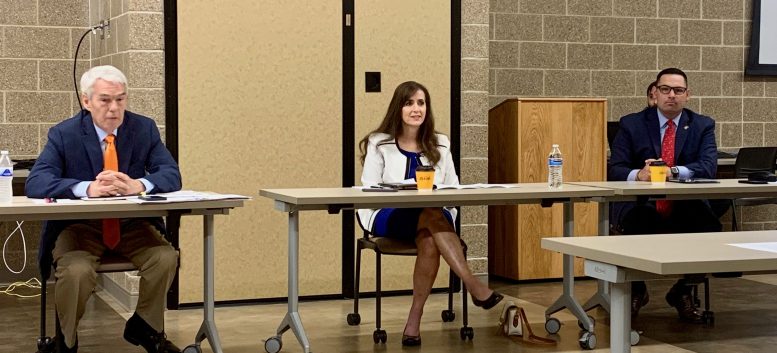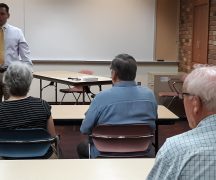BY ANDREW BAILEY
BG Independent News Correspondent
Three Ohio government officials convened Friday morning to update the public on legislation and other projects in the works during the Bowling Green Chamber of Commerce’s Legislative Update.
Senator Theresa Gavarone, Representative Haraz Ghanbari, and Chancellor of Higher Education Randy Gardner each took 10 minutes to speak on their agendas.
Gavarone highlighted the work of H2Ohio, a water quality initiative that combats decades-long water issues, like the harmful algae blooms in Lake Erie. The initiative has also increased the guaranteed funding for the Department of Agriculture.
Ghanbari said blame for algal bloom should be collective, and not placed on farmers or specific institutions.
He advocated for sensors being placed at borders where waterways enter Ohio, as well as further down Ohio waterways. He hopes these can detect algal bloom in the water to determine if Ohio is a contributing factor or if it’s coming from neighboring states.
Gavarone said there is a legislative caucus task force from states connected to the Great Lakes collaborating on solving the issue.
She also celebrated the approval of SB 288 by the Senate this week, which increases freedom of religious apparel during school athletics and extracurriculars.
And SB 25, carried over from the last general assembly, will tighten up drug trafficking laws in the vicinity of drug treatment centers and prohibit defrauding on drug tests.
After four appearances in the legislature, they are currently revising SB 126 — Collin’s Law — that would toughen penalties for hazing, in light of the alleged hazing death of BGSU student Stone Foltz in March. Gavarone said she hopes the bill be finalized soon.
Ghanbari also called for more discussion and education on hazing prevention. “From my perspective, it needs to be addressed. It’s long overdue,” he said. The Ohio House is working on its own legislation on hazing and bullying, HB 310, which is co-sponsored by Ghanbari.
He also touched on codes regarding limits on the authority of township police departments. Under current Ohio Revised Code, only police departments in townships of 50,000 or more residents can enforce laws on the interstate in their jurisdiction, he said. HB 206, which he sponsored, is aimed at giving more authority on the interstate to local police departments, contingent on authorization from the board of trustees of individual townships.Because of provisions in the bill, Ghanbari said it would only be applicable to 44 of the township police departments in the state.
HB 272, which Ghanbari sponsored, will require authentication of “large-volume third-party sellers” in online marketplaces to push back against counterfeit and stolen items being sold on websites like Amazon and Etsy.
Gardner, commenting on the legislative work of Gavarone and Ghanbari, encouraged members of the public to “make the call. Write the letter. Send the extra email. They listen and they’re accessible.” That’s the kind of effort that helped begin the Ohio Public Library Information Network, he said.
Gardner said higher education in Ohio offers “diversity in opportunity,” in majors and careers.
He hosted roundtables with college students during the pandemic, and one student brought up the declining mental health of college students over the past year. Federal funds were then allocated to mental health services for college students, making Ohio the first state in the country to use federal funds to do so.
Before the post-presentations Q&A session, Gardner said that as a representative of Gov. Mike Dewine, he was not permitted to answer many of the pre-submitted questions.
Speaking on challenges over the past year, Ghanbari was concerned with businesses finding employees willing to work during the pandemic.
Gavarone and Ghanbari were asked about redistricting when the delayed Ohio Census results are finalized. Gavarone said fair districts are important to everyone, “so we want to make sure we do it right.” Ghanbari chose not to comment on the topic of redistricting.





